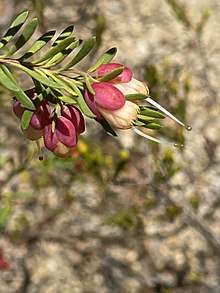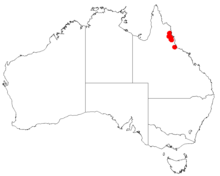Homoranthus porteri
Homoranthus porteri is a plant in the myrtle family, Myrtaceae and is endemic to a small area in northern Queensland. It is an upright shrub with creamy-white to red pendulous flowers in pairs on a short stalk with red bracts and small linear leaves.
| Homoranthus porteri | |
|---|---|
 | |
| Homoranthus porteri in the Australian National Botanic Gardens | |
| Scientific classification | |
| Kingdom: | Plantae |
| Clade: | Tracheophytes |
| Clade: | Angiosperms |
| Clade: | Eudicots |
| Clade: | Rosids |
| Order: | Myrtales |
| Family: | Myrtaceae |
| Genus: | Homoranthus |
| Species: | H. porteri |
| Binomial name | |
| Homoranthus porteri | |
 | |
| Occurrence data from AVH | |
| Synonyms[1] | |
| |
Description
Homoranthus porteri is a shrub growing to 2.5 m (8 ft 2 in) high. The leaves are a dull green, small, slightly smooth, about 12 mm (0.47 in) long, 1.5 mm (0.059 in) wide and arranged spirally in pairs at right angles to the previous pair on the branches. The small flowers hang pendulous in pairs on a stalk from the leaf axils. The flowers have red bracts and a style about 1.5 cm (0.59 in) long that protrudes from the centre of the flower petals. Flowering occurs mostly in autumn but may flower and fruit sporadically throughout the year.[2][3][4][5]
Taxonomy and naming
This species was first formally described in 1931 by C.T. White who gave it the name of Darwinia porteri and published the description in Proceedings of the Royal Society of Queensland.[6][7] In 1991, Lyndley Craven and S.R.Jones changed the name to Homoranthus porteri.[8] The specific epithet (porteri) honours Charles Porter who collected the type specimen.[7]
Distribution and habitat
Homoranthus porteri is restricted to an area between Mareeba and Ravenshoe, Queensland. It is usually found adjacent to woodland, scree slopes or heath, growing on shallow sandstone soils and rock outcrops.[5][9]
Conservation
Homoranthus porteri is listed as "vulnerable" under the Australian Government EPBC Act.[9] This species is uncommon with a restricted distribution, ROTAP conservation code 2V, Briggs and Leigh (1996).[5]
References
- "Homoranthus porteri". World Checklist of Selected Plant Families (WCSP). Royal Botanic Gardens, Kew.
- Byrnes, Norman B. (1984). "A new species of genus Darwinia (Myrtaceae) for Queensland". Austrobaileya. 2 (1): 15–16.
- Bean, Tony; Mayhew, Melissa. "Homoranthus porteri". The State of Queensland Department of Environment and Science. Retrieved 24 August 2018.
- "Homoranthus porteri". Australian Native Plants Society (Australia). Retrieved 24 August 2018.
- Copeland, Lachlan M.; Craven, Lyn A.; Bruhl, Jeremy J. (2011). "A taxonomic review of Homoranthus (Myrtaceae: Chamelaucieae)". Australian Systematic Botany. 24 (6): 351. doi:10.1071/SB11015.
- "Darwinia porteri". APNI. Retrieved 24 August 2018.
- White, Cyril (1931). "Two previously undescribed Queensland Myrtaceae". Proceedings of the Royal Society of Queensland. 43: 15–16. Retrieved 24 August 2018.
- "Homoranthus porteri". APNI. Retrieved 24 August 2018.
- "Approved Conservation Advice for Homoranthus porteri" (PDF). Australian Government Department of the Environment. Retrieved 24 August 2018.
